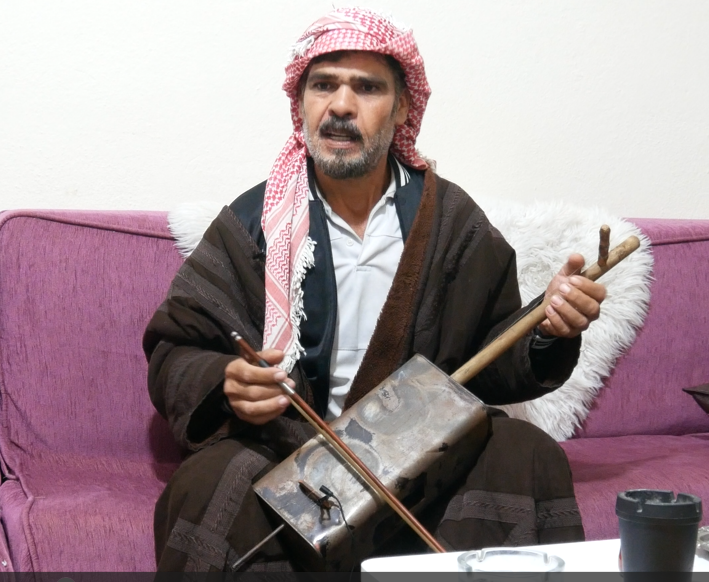Singing and Folk Chants of the Palmyrene Shepherd
By: Hassan Ali
Translation: Yousef Awad
The chant is a folk heritage sung by locals in many occasions such as in weddings, reception, farewells, love, and even at times of death. The Bedouins, especially in the Palmyrene Badyia, are always on the move, traveling from place to place in search of water and pasture, using their traditional means of camels, donkeys, and horses. This is usual as per their inherited social lifestyle, passed down from generation to generation, this is also resulted in a particular style of singing called “chants.” The most famous practitioners among the Bedouins are those who go out to graze and sing these chants without accompanying any musical instruments, except for the “Rebab,” a one-stringed instrument, with the aim of entertainment and relieving the soul from the pressures of work and harsh life. These chants take the form of poems in colloquial verse according to the dialect of each tribe scattered throughout the Palmyrene desert. Sometimes, these chants may take another form of cries and melodic terms used by the shepherd as a language to communicate with his sheep when he calls them to drink water or when gathering them for milking and other purposes.
Regarding the songs and chants of Palmyra that associated with shepherding and shepherds, Mr. Mohammed Abdul Karim Fahd, a 45-year-old from Palmyra, narrates: “In addition to my profession as a sheep herder, I worked as a player of the Rebab and the Mijwiz, and you can see my work on social media. I have many TV shows with many local and international television channels, and I was a Dabke dance coach for the folk groups in Palmyra. The Rebab was the shepherd’s companion, who instinctively recited poetry and sang it during his herding journey with his sheep. For example, if he heard the howling of a wolf, he would recite a poem like ‘Oh wolf, stop howling’ as an example… And here is a collection of chants that we used to be singing during the herding journey:
Here is the translation of the first chant (recited by the interviewee singing with playing the Rabab):
Oh eye, you have abandoned sleep for several nights
after my mind and thoughts were lost by my beloved you have led me astray
oh heart, you have no guardian, The heart became confused and started walking slowly
I asked for the love potion and it was carried before me, Why does she need it from me before the light spreads?
Oh my regret, they humiliated her in the nights, And I bowed my head the day they started to carry
Oh my regret, they humiliated her in the nights, And I bowed my head the day they started to carry
They stood like the cloud that is followed by the north wind, Near the desert and near its monastery
This is the place of my companion, oh my lawful one And this is the place where they might be frightened
And there, the lawful girl calls out to me, And I say to your eye, you are after every beauty
And with the goodness of your father they strike examples An elder who cuts off the head from atop the bodies
The second poem from the Palmyrene heritage (sung in a separate segment) tells of a young man and a woman who loved each other. Afterward, the young man left home and went to work herding the ‘Awassi’ sheep. The journey lasted for many years, and after several years, the young man returned to his tribe and saw the girl he loved, whose skin had become darker than before. Upon seeing her, he recited this poem to her:
Oh dark beauty, you have ignited flames in my heart, The breeze blew and carried her high into the sky
It blew and ignited between two ribs, Not even the sea waves could extinguish it
I kept on walking the path from dawn till night, Searching for her and her home
I kept on walking the path from dawn till night, Searching for her and her home
After twenty years, the young man found his lost love and continued his poem, saying:
I kept on walking the path from dawn till night, Searching for her and her home
I kept on walking the path from dawn till night, Searching for her and her home
I found my beloved asleep and with wilted eyes, I startled and found myself under the edge of her cover
She said to me, “Who are you, the one touching the eggs? No one has ever walked upon us before you”
I found my beloved asleep and with wilted eyes, I startled and found myself under the edge of her cover
She said to me, “Who are you, the one touching the eggs? No one has ever walked upon us before you”
She told me to rise and surrender yourself before I cry out twice, And my brothers who are strong will come to you
And my father, like many flames , that The enemy’s courtyard cannot extinguish its edges
And here he says:
I’ve spent years and months searching for you, And the day I found you, I found my own desires By God,
When she recognized me, she started to appease me, Like the affectionate one who tends to her young
She said to me, “Where have you been, welcome, where have you been, my people welcome you Oh companion of my youth
Welcome to you as much as the mills have ground And as much as the lightning has brought in the sky


